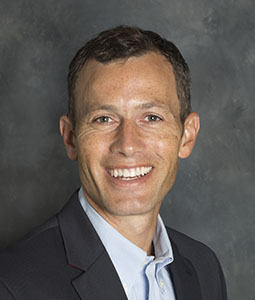As research assistant Daniel Negrete talked with recipients of the Deferred Action for Childhood Arrivals program, he began reflecting on his own experiences and how sharing them might help someone else.
Before helping with interviews for social work professor Ben Roth’s research on the program, Negrete — a DACA recipient himself — had considered his status a private issue. His parents are from Mexico, and he came to the United States when he was just 1 year old. Now in his 30s, the University of South Carolina graduate (2015 business) has lived most of his life in Aiken, South Carolina.
“I wouldn't share my situation unless I had to,” he says. “A lot of the individuals I spoke with felt the same way. They felt like it was personal and didn’t feel comfortable letting others know.”
But as he listened to the stories of other South Carolina recipients, Negrete, who manages a department store in Aiken, began to realize his experience might help others navigate some of the challenges of the program.
Introduced by President Barack Obama in 2012, the Deferred Action for Childhood Arrivals program has allowed hundreds of thousands of people who were brought to the United States as children to temporarily remain in the country and obtain work permits. The program has faced legal and political challenges.
“I was two years away from graduating with a degree in the field I wanted at the school I wanted, and some of them (DACA recipients in South Carolina) still couldn't get their foot in the door in college,” says Negrete who, after an arduous route, was able to navigate the system and find a way to enroll at USC.
The interplay of immigration policy
Roth is co-authoring a book about the Deferred Action for Childhood Arrivals program based on data collected between 2013 and 2019. About 500 individuals in six states — Arizona, California, New York, Illinois, Georgia and South Carolina — participated in interviews for the research. They were asked questions about topics such as their families and immigration experience, how they received DACA, what their concerns were, how it opened new opportunities, if they feared being deported, and barriers they have encountered.
Consistent with other research on the impact of DACA, Roth’s team found that young people who received DACA benefited in important ways. They were more likely to go to college, have a larger income and were more likely to establish credit. However, they also found the benefits of DACA are tempered by factors such as state policies, race and ethnicity. Recipients also face constant signals that make them feel like they don’t belong.
Access to higher education and some professions were among the challenges faced by DACA recipients. Those obstacles are especially prevalent in states like South Carolina where, for example, DACA recipients must pay out-of-state tuition to attend public universities and licensing laws may block them from careers in their field.
Negrete shared his personal experience with the tangle of licensing requirements, which eventually deterred him from seeking a position in his field when he graduated. Although he had a business degree with a concentration in finance, he says it was frustrating trying to navigate the process as a DACA recipient. Later, when he had a potential opportunity in the banking industry, he learned he could obtain the required licenses but was already established in his current career.
Negrete says the inability to obtain licensing or the effort required to peel back the layers of what's required may contribute to "brain drain" in South Carolina as DACA recipients can be faced with the decision to move to another state with more friendly licensing laws for their fields, which range from nursing and law to teaching, social work and cosmetology.
Examples of how the U.S. government has created an uncertain status — such as DACA — for undocumented immigrants is a theme from the research that will be presented in the book.
“DACA has largely been heralded as a success because it has provided so many — about 600,000 beneficiaries — the opportunity to work and stay legally in the country,” Roth says. “But the book also will explore the duality of DACA. Interviews over several years drew out a story of what it means to live with DACA when you’re caught in-between — temporarily protected from deportation and able to live and work like a citizen, but without any of the guarantees of citizenship. It gives them a taste of belonging, but they are held accountable to a set of standards that means they are always living with a threat of expulsion.”

Uncertainty and a sense of belonging
Research assistant Ilsia Muñiz found that many of the recipients she interviewed expressed gratitude for the DACA program despite the barriers they face. Muñiz was born in the U.S. and is a citizen. Her parents immigrated from Guatemala and Mexico.
“I think because I was born here, I tended to look at the program more critically,” she says. “I don’t think it’s fair recipients have the uncertainty and cost of renewing their status every two years. But although there were disappointments, hearing them be so thankful for the opportunities they didn’t have before helped me appreciate it from another viewpoint.”
In South Carolina, all of those interviewed for the research were Hispanic. Since 2000, South Carolina's Hispanic population has grown 366 percent from around 96,000 to just under 353,000 (from 2.4 percent to nearly 6.9 percent of the total population), according to a 2022 report by the S.C. Commission for Minority Affairs.
“When many people think of the Latino community, they think of immigrants, but of course, just a percentage of South Carolina’s Latino residents are immigrants. Many have lived here for at least a generation,” Roth says. “They are not newcomers. They are long-term residents and local leaders.”
When some interviewees encountered situations that made them feel like they didn't belong, they became more motivated to be civically engaged. Others were more likely to withdraw and become less active.
Roth says a factor in how they respond seems to be affected by the presence of active Latino support and advocacy organizations, such as the Hispanic Alliance in South Carolina’s Upstate. The Greenville organization collaborates within the community and with agencies to connect resources, mentoring and educational opportunities.
“The stories of real success in the face of so many challenges are incredibly inspirational, but the struggles that persist are really burdensome and weigh on me,” Roth says. “I think it ought to weigh on all of us — and especially the people who vote these policies in place.”
By providing insight into the experience of living with DACA, he hopes his research and forthcoming book will be a resource, particularly for policymakers, to provide a better understanding of how current immigration policies are restricting individuals as well as their broader communities from their full potential. While the federal government passes laws that regulate who can enter the country, state and local lawmakers enact legislation that affects what happens when they arrive — such as professional licensing laws.
Negrete recalled the experience of a DACA recipient who wanted to be an esthetician. All she wanted to do, he says, was “make people’s eyebrows look pretty,” but she wasn’t able to because she was denied a license.
“That was astounding,” he says. “I wish I could change things, so that not everyone has to go through these obstacles. Before I didn’t really want to talk about my status, but after the interviews, I wanted to do more to share my story. A lot of the individuals who were able to make progress toward their dreams did it through talking and spreading awareness. By being vulnerable enough to share their situation, they became their own advocate, and some were able to find other advocates within their circles and community.”

